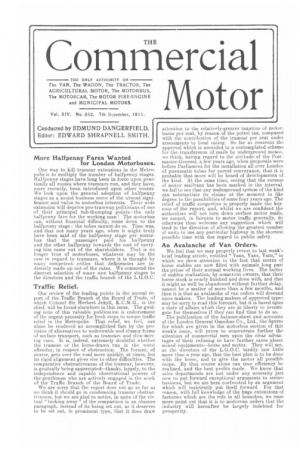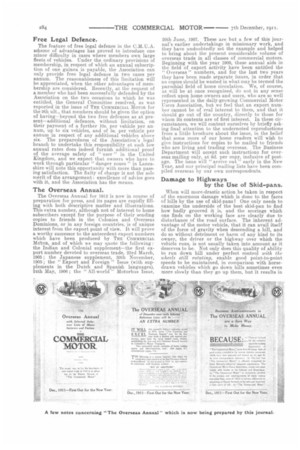More Halfpenny Fares Wanted for London Motorbuses.
Page 1

Page 2

Page 3

If you've noticed an error in this article please click here to report it so we can fix it.
One way to kill tramcar extensions in the Metropolis is to multiply the number of halfpenny stages. Halfpenny stages have long been in force upon practically all routes where tramcars run, and they have, more recently, been introduced upon other routes. We look upon the general adoption of halfpenny stages as a sound business move of the utmost significance and value to motorbus interests. Their wide extension will deprive pro-tramway politicians of one of their principal tub-thumping points—the only halfpenny fare for the working man! The motorbus can, without financial difficulty, come down to the halfpenny stage the tubes cannot do so. Time was, and that not many years ago, when it might truly have been said of the halfpenny stage per motorbus that the passenger paid his halfpenny and the other halfpenny towards the cost of carrying him came out of the shareholders. That is no longer true of motorbuses, whatever may be the case in regard to tramcars, where it is thought by many competent critics that deficiencies are indirectly made up out of the rates. We commend the discreet selection of many new halfpenny stages to the directors and the traffic branch of the L.G.O.C,
Traffic Relief.
Our review of the leading points in the annual report of the Traffic Branch of the Board of Trade, of which Colonel Sir Herbert Jekyll, K.C.M.G'., is the chief, will be found elsewhere in this issue. The guiding note of this valuable publication is endorsement of the urgent necessity for fresh steps to secure traffic relief in the Metropolis. That relief, we feel, can alone be rendered an accomplished fact by the provision of alternatives to undesirable and clumsy forms of surface transport, such as tramcars and slow-moving vans. It is, indeed, extremely doubtful whether the tramcar or the horse-drawn van is the worst offender, in respect of obstruction. The former, of course, gets over the road more quickly, at times, but its rigid alignment gives rise to other difficulties. The comparative obstructiveness of the tramcar, however, is gradually being appreciated—thanks, largely, to the independence and capable observational powers of the gentlemen who are actively engaged in the work of the Traffic Branch of the Board of Trade.
We are sorry that the report does not go as far as we think it should go in condemning tramcar obstructiveness, but we are glad to notice, in spite of the virt uai " tucking away" of the comparison in an obscure paragraph, instead of its being set out, as it deserves to be set out, in prominent type, that it does draw attention to the relatively-greater taxation of motorbuses per seat, by reason of the petrol tax, compared with the contribution of the tramcar per seat under assessments to local rating. So far as concerns the approval which is accorded to a contemplated scheme for the transference of mails by underground means, we think, having regard to the attitude of the Postmaster-General, a few years ago, when proposals were before Parliament for the installation all over London of pneumatic tubes for parcel conveyance, that it is probable that more will be heard of developments of the kind. At the same time, seeing that the success of motor mailvans has been marked in the interval, we fail to see that any underground system of the kind can substantiate its claims at the moment in like degree to the possibilities of some four years ago. The relief of traffic congestion is properly made the keynote of the report, and, whilst we are confident the authorities will not turn down surface motor mails, we cannot, in fairness to motor traffic generally, do otherwise than welcome any suggestion which will tend in the direction of allowing the greatest number of units to use any particular highway in the shortest possible time with due regard to public safety.
An Avalanche of Van Orders.
We feel that we may properly revert to last week's brief leading article, entitled " Vans, Vans, Vans," in which we drew attention to the fact that scores of horse stables are now filled with animals long past the prime of their normal working lives. The factor of sudden realization, by numerous owners, that their horse stock is nearly finished and done with, and that it might as well be abandoned without further delay, cannot be a matter of more than a few months, and then it is that an avalanche of van orders will descend upon makers. The leading makers of approved types may be sorry to read this forecast, but it is based upon a state of affairs which they are at liberty to investigate for themselves if they can find time to do so. The publication of the balance-sheet and accounts of the London General Omnibus Co., Ltd., the figures for which are given in the motorbus section of this week's issue, will prove to concentrate further the attention of commercial men upon the clear advantages of their refusing to have further cares about mixed equipments—horse and motor. They will see, as the directors of the L.G.O.C. tardily saw little more than a year ago, that the best plan is to be done with the horse, and to give the motor all possible scope. By that course alone can true efficiency be realized, and the best profits made. We know that sales departments are not under any necessity just now to put forward exceptional arguments to secure business, but we are here confronted by MI argument which will insistently put itself forward. For that reason, with full knowledge of the huge extensions of factories which are the rule in all branches, we once more point out that it is to rnotorvan orders that the industry will hereafter be largely indebted for prosperity.
Free Legal Defence.
The feature of free legal defence in the C.M.U.A. scheme of advantages has proved to introduce one minor difficulty in cases where members own large fleets of vehicles. Under the ordinary provisions of membership, in respect of which an annual subscription of one guinea is payable, the Association can only provide free legal defence in two cases per annum. The reasonableness of this limitation will be appreciated, when the other advantages of membership are considered. Recently, at the request of a member who had been successfully defended by the Association on the two occasions to which he was entitled, the General Committee resolved, as was reported in the issue of THE COMMERCIAL MOTOR for the 9th ult., that members should be given the option of having—beyond the two free defences as at present—additional defences, without limitation, on their payment of a further 10s. per vehicle per annum, up to six vehicles, and of 5s. per vehicle per annum in respect of any additional vehicles above six. The preparedness of the Association's legal branch to undertake this responsibility at such low annual rates does indeed furnish additional proof of the average safety of " user " in the United Kingdom, and we expect that owners who have to work through particular "danger zones " in Lancashire will note this opportunity with more than passing satisfaction. The fixity of charge is not the solo merit of the arrangement : excellence of advice goes with it, and the Association has the means.
The Overseas Annual.
The Overseas Annual for 1912 is now in course of preparation for press, and its pages are rapidly filling with both descriptive matter and illustrations. This extra number, although not of interest to home subscribers except for the purpose of their sending copies to friends in the Colonies and Overseas Dominions, or in any foreign countries, is of unique interest from the export point of view. It will prove a worthy successor to the antecedent export numbers which have been produced by TEE COMMERCIAL Moirox, and of which we may quote the following : the Indian and Colonial supplement—the first export number devoted to overseas trade, 23rd March, 1905; the Japanese supplement, 30th November, 1905; the "Export and Foreign " Issue (with supplements in the Dutch and Spanish languages), 24th May, 1906; the " All-world " Motorbus Issue, 20th June, 1907. These are but a few of this journal's earlier undertakings in missionary work, and they have undoubtedly set the example and helped to bring about the present considerable volume of overseas trade in all classes of commercial motors. Beginning with the year 1909, these annual aids in the field of export activity have been entitled the " Overseas" numbers, and for the last two years they have been made separate issues, in order that no copies should be wasted in what may be termed the parochial field of home circulation. We, of course, as will be at once recognized, do not in any sense reflect upon home owners and users, who are so well represented in the daily-growing Commercial Motor Users Association, but we feel that an export number cannot be of real interest to them, and that it should go out of the country, directly to those for whom its contents are of first interest. In these circumstances, we will content ourselves by briefly asking final attention to the undernoted reproductions from a little brochure about the issue, in the belief that some more of our home readers will wish to give instructions for copies to be mailed to friends who are living and trading overseas. The Business Department will accept such instructions for overseas mailing only, at Bd. per copy, inclusive of postage. The issue will "arrive out" early in the New Year, and our principal mailing lists have been compiled overseas by our own correspondents.
Damage to Highways by the Use of Skid-pans.
When will more-drastic action be taken in respect of the enormous damage which is done to the faces of hills by the use of skid-pans? One only needs to examine the underside of the best skid-pan to find how badly grooved it is, and the scorings which one finds on the working face are clearly due to disturbance of the road surface. The inherent advantage of the motor vehicle, that it can avail itself of the force of gravity when descending a hill, and do so without detriment or harm of any kind to its owner, the driver or the highway over which the vehicle runs, is not usually taken into account as it deserves to be. Not only does this quality of ability to run down hill under perfect control with, the wheels still rotating, enable good point-to-point speeds to be maintained, in comparison with horsedrawn vehicles which go down hills sometimes even more slowly than they go up them, but it results in the minimum of wear and tear. There should be no damage to the vehicle or to the road. The rolling action of the wheel of a motor vehicle does not produce harmful surface friction, whereas the filing action of the skid-pan does almost incalculable damage.. Another important feature in relation to modern road construction, and one which is again fatal to the skid-pan, is found in the disintegration of a tar-bound or pitch-hound surface, due to the heating effect set up by skid-pans, and the softening of the tar or pitch present for binding purposes. The skid-pan should be condemned wherever possible, and its use should certainly be more carefully supervised by the authorities




















